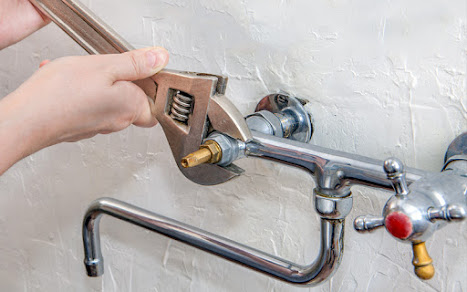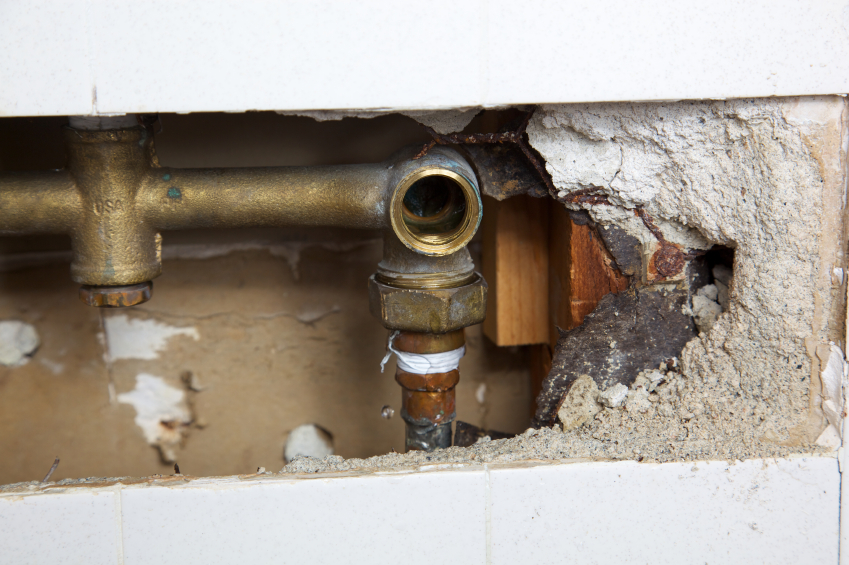Noisy Plumbing Troubles Fixed!
Noisy Plumbing Troubles Fixed!
Blog Article
This article which follows on the subject of How To Fix Noisy Pipes is unquestionably enlightening. Don't miss out on it.

To detect loud plumbing, it is important to establish first whether the unwanted sounds happen on the system's inlet side-in other words, when water is turned on-or on the drain side. Noises on the inlet side have actually differed reasons: excessive water pressure, used shutoff and also faucet parts, improperly connected pumps or other appliances, incorrectly placed pipe fasteners, and plumbing runs including a lot of tight bends or other restrictions. Noises on the drainpipe side generally stem from poor location or, as with some inlet side noise, a design consisting of limited bends.
Hissing
Hissing sound that takes place when a tap is opened a little generally signals excessive water pressure. Consult your local water company if you think this problem; it will be able to tell you the water pressure in your area as well as can set up a pressurereducing valve on the incoming supply of water pipe if required.
Other Inlet Side Noises
Creaking, squeaking, scratching, snapping, and tapping usually are triggered by the expansion or contraction of pipes, generally copper ones supplying hot water. The audios take place as the pipelines slide versus loosened bolts or strike close-by home framing. You can frequently pinpoint the location of the trouble if the pipelines are revealed; simply comply with the sound when the pipes are making sounds. More than likely you will certainly find a loose pipe hanger or a location where pipelines lie so close to floor joists or various other mounting pieces that they clatter against them. Connecting foam pipe insulation around the pipelines at the point of call must fix the problem. Be sure bands as well as hangers are secure and also supply sufficient support. Where feasible, pipeline fasteners should be affixed to large structural elements such as structure walls instead of to mounting; doing so minimizes the transmission of vibrations from plumbing to surface areas that can enhance and move them. If attaching bolts to framing is inevitable, wrap pipelines with insulation or other durable material where they call fasteners, as well as sandwich the ends of brand-new bolts between rubber washing machines when installing them.
Dealing with plumbing runs that struggle with flow-restricting limited or numerous bends is a last resource that should be taken on only after speaking with a proficient plumbing professional. Sadly, this situation is relatively usual in older houses that might not have actually been built with interior plumbing or that have actually seen several remodels, particularly by beginners.
Chattering or Shrieking
Extreme chattering or screeching that happens when a shutoff or faucet is switched on, which usually vanishes when the installation is opened totally, signals loose or faulty inner components. The solution is to replace the shutoff or tap with a new one.
Pumps as well as home appliances such as cleaning machines as well as dishwashers can transfer electric motor noise to pipes if they are incorrectly attached. Connect such items to plumbing with plastic or rubber hoses-never stiff pipe-to isolate them.
Drain Sound
On the drainpipe side of plumbing, the principal objectives are to remove surface areas that can be struck by falling or rushing water as well as to protect pipelines to have inescapable sounds.
In new building, tubs, shower stalls, commodes, and also wallmounted sinks and also containers should be set on or against resilient underlayments to decrease the transmission of noise with them. Water-saving bathrooms and also taps are much less loud than standard models; mount them rather than older kinds even if codes in your location still allow making use of older components.
Drains that do not run up and down to the cellar or that branch right into straight pipeline runs sustained at flooring joists or other framing present especially bothersome sound troubles. Such pipes are large enough to radiate significant vibration; they likewise bring substantial quantities of water, that makes the scenario even worse. In brand-new construction, specify cast-iron soil pipes (the large pipes that drain bathrooms) if you can afford them. Their enormity includes much of the noise made by water passing through them. Also, stay clear of directing drains in wall surfaces shown bed rooms as well as spaces where people gather. Walls including drainpipes ought to be soundproofed as was described earlier, using double panels of sound-insulating fiber board and also wallboard. Pipelines themselves can be covered with unique fiberglass insulation produced the function; such pipes have an invulnerable vinyl skin (in some cases containing lead). Results are not constantly satisfactory.
Thudding
Thudding noise, usually accompanied by shivering pipelines, when a tap or home appliance valve is turned off is a condition called water hammer. The sound and also resonance are triggered by the reverberating wave of stress in the water, which suddenly has no area to go. Often opening a valve that discharges water promptly right into a section of piping containing a restriction, joint, or tee installation can create the same problem.
Water hammer can normally be treated by installing installations called air chambers or shock absorbers in the plumbing to which the issue valves or taps are attached. These gadgets allow the shock wave developed by the halted flow of water to dissipate in the air they have, which (unlike water) is compressible.
Older plumbing systems might have short upright areas of capped pipe behind wall surfaces on tap runs for the very same function; these can eventually loaded with water, minimizing or destroying their performance. The remedy is to drain the water supply totally by shutting down the primary water valve and also opening all taps. Then open the major supply valve and also close the taps one at a time, starting with the tap nearest the valve and also ending with the one farthest away.
3 Most Common Reasons for Noisy Water Pipes
Water hammer
When water is running and is then suddenly turned off, the rushing liquid has no place to go and slams against the shut-off valve. The loud, thudding sound that follows is known as a water hammer. Besides being alarming, water hammer can potentially damage joints and connections in the water pipe itself. There are two primary methods of addressing this issue.
Check your air chamber. An air chamber is essentially a vertical pipe located near your faucet, often in the wall cavity that holds the plumbing connected to your sink or tub. The chamber is filled with air that compresses and absorbs the shock of the fast moving water when it suddenly stops. Unfortunately, over time air chambers tend to fill with water and lose their effectiveness. To replenish the air chambers in your house you can do the following. Turn off the water supply to your house at the main supply (or street level). Open your faucets to drain all of the water from your plumbing system. Turn the water back on. The incoming water will flush the air out of the pipes but not out of the vertical air chamber, where the air supply has been restored. Copper pipes
Copper pipes tend to expand as hot water passes through and transfers some of its heat to them. (Copper is both malleable and ductile.) In tight quarters, copper hot-water lines can expand and then noisily rub against your home's hidden structural features — studs, joists, support brackets, etc. — as it contracts.
One possible solution to this problem is to slightly lower the temperature setting on your hot water heater. In all but the most extreme cases, expanding and contracting copper pipes will not spring a leak. Unless you’re remodeling, there's no reason to remove sheetrock and insert foam padding around your copper pipes.
Water pressure that’s too high
If your water pressure is too high, it can also cause noisy water pipes. Worse, high water pressure can damage water-supplied appliances, such as your washing machine and dishwasher.
Most modern homes are equipped with a pressure regulator that's mounted where the water supply enters the house. If your home lacks a regulator, consider having one professionally installed. Finally, remember that most plumbers recommend that water is delivered throughout your home at no lower than 40 and no greater than 80 psi (pounds per square inch).
Whatever the state of your plumbing, one thing is certain — you’re eventually going to encounter repair and replacement issues around your home that require professional help. That’s where American Home Shield can come to your aid.
https://www.ahs.com/home-matters/repair-maintenance/causes-of-noisy-water-pipes/

As a passionate person who reads on Why Do My Plumbing Pipes Make A Knocking Noise, I assumed sharing that chunk was essential. So long as you appreciated our post plz remember to share it. Thanks for your time spent reading it.
Browse Our Site Report this page